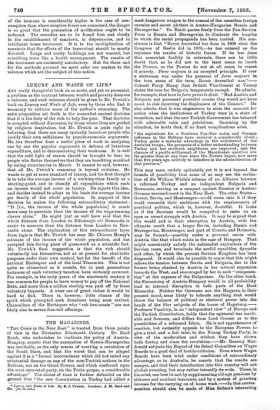LUXURY AND WASTE OF LIFE.*
ANY really thoughtful book on so acute, and yet so perennial, a problem as the contrast between wealth and poverty deserves a welcome, and such welcome should be given to Mr. Urwick's book on Luxury and Waste of Life, even by those who find it necessary to criticise some of the author's reasoning. The main proposition set forth is the somewhat ancient doctrine that it is the duty of the rich to help the poor. That doctrine is accepted without discussion by those whose lives are guided by religious inspiration, but Mr. Urwick is quite right in believing that there are many cynically luxurious people who justify their own selfishness by pseudo-economic arguments. He has therefore done a useful'piece of work in analysing one by one the popular arguments in defence of luxurious expenditure, and in demonstrating their weakness. It is well that the cold light of reason should be brought to bear on people who flatter themselves that they are benefiting mankind by eating strawberries in March. It cannot be said, however, that all Mr. Urwick's reasoning is beyond criticism. He wants to get at some standard of luxury, and his first thought is to take the average income of a working-class family as a starting-point, and to classify all expenditure which such an income would not cover as luxury. He rejects this idea, and decides instead to adopt as his basis the average income per family of the whole population. In support of this decision he makes the following extraordinary statement: "It [i.e., the income of the whole population] is much mere easy to ascertain than the income of the wage-earning classes alone." He might just as well have said that the whole distance from London to Edinburgh rid Newcastle is easier to measure than the distance from London to New- castle alone. The explanation of this extraordinary lapse from logic is that Mr. Urwick has seen Mr. G'hiozza Money's estimate of the income of the whole population, and has accepted this daring piece of guesswork as a scientific fact. Mr. Urwiok's final suggestion is that the rich should voluntarily tax themselves, not as at present for charitable purposes under their own control, but for the benefit of the national Exchequer and of the local Treasuries. This is not quite so chimerical as it sounds, for in past generations instances of such voluntary taxation have certainly occurred. For example, in the early years of the nineteenth century it was common for people to leave money to pay off the National Debt, and more thaii a million sterling was paid off by these voluntary bequests. A wiser use of great riches it would be bard to find. There is, however, little chance of the spirit which prompted such donations being soon revived. Chancellors of the Exchequer who " rob hen-roosts " are not likely also to secure free-will offerings.




























































 Previous page
Previous page